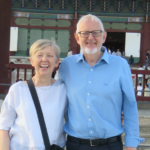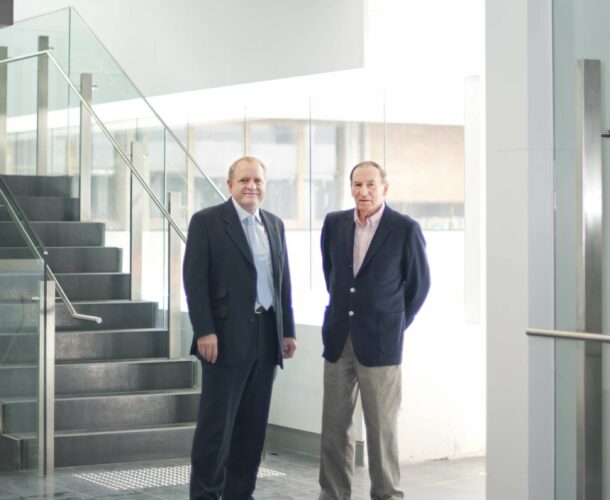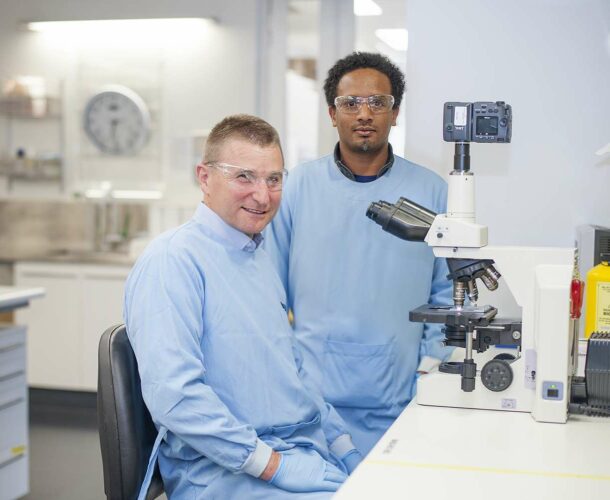A family discovery
A few years ago, Benalla GP Dr Gerard Brownstein, his brother David and sister Elizabeth became involved in managing the affairs of their father, Mr Edward (“Eddie”) Brownstein, a respected country surgeon ailing with dementia, who died in May 2014. Their responsibilities included administration of the Drakensberg Charitable Trust, which Eddie set up in 1978 to donate— often anonymously— to social justice causes and medical research, including research at the Walter and Eliza Hall Institute. But it took time before the full significance of the Trust’s legacy dawned on Gerard.
“Initially we weren’t sure we would be able to do justice to the Trust, and considered having a professional manager operate it,” recalls Gerard. “But I think as time went on we realised what an incredible privilege this was for us, to be able to continue the work that had been such an important part of Dad’s life.”
Behind the Trust is a story about Eddie’s almost 50 year relationship with The Walter and Eliza Hall Institute, his complicated relationship with his own father and the strong sense of compassion for others that motivated his life.
Childhood under apartheid
Drakensberg is the name of the beloved mountains in Eddie’s native South Africa. He was raised in a Jewish family in Johannesburg. His father was a hard-working stockbroker and after his mother had died when he was three he was cared for by Maggie, an African nanny. Though his father did his best to protect the family’s African servants from the tyranny of apartheid, Eddie’s eyes were open at an early age to racial injustice.
“I think dad basically had a very unhappy childhood,” Gerard explains. “He grew up missing his mother and while Grandpa Mark (Marcus Brownstein) was very successful in business, he wasn’t a happy man.”
Exposure to social injustice
Eddie became increasingly troubled by apartheid-era South Africa. As a medical student in the 1950s, he saw the impact of poverty and violent suppression on the black community in the hospital wards. He had just completed his surgical training in Edinburgh when news filtered through of the Sharpeville Massacre, in which South African police killed 80 peaceful protestors.
After much soul searching, Eddie and his wife Kitty, a university librarian, decided not to return home but to seek a safer life for their young family. They immigrated to Australia, settling in Western Victoria.
“When Grandpa Mark retired he offered his three children a large amount of money. Dad was in Horsham at the time”— Eddie was a surgeon at Wimmera Base Hospital— “and he was very happy. And he said to his dad, ‘no, I’ll make my own way.’
“So in 1978 when Grandpa Mark died, dad saw an opportunity to use his inheritance to help others and set up the Drakensberg Trust.”
An understated champion of medical research
Being the son of a stockbroker, Eddie was a conservative and sharp-eyed investor. He considered the Walter and Eliza Hall Institute a worthy beneficiary, reassured the money would go towards frontline research and not backroom administrative costs.
Professor David Vaux was an intern at Wimmera Base Hospital when he first met Eddie. Years later, Vaux got chatting to Eddie and explained he was embarking on a PhD at the Walter and Eliza Hall Institute. “Eddie said he’d heard of the place and wondered what my next project would be.”
Vaux was then “mightily impressed to hear that a surgeon in Horsham knew about transgenic mice, oncogenes and their activation by chromosomal translocations.” It was a decade later that Vaux finally learned why Eddie knew about these concepts – he’d been funding the institute’s research.
In the 1990s Vaux used to run into Eddie each year at the annual general meeting of the Victorian Cancer Council— putting two and two together he realised that Eddie was a donor to the Council too.
“His main driver was compassion— he wanted to make a difference,“ says Beverley Brownstein, Eddie’s wife of 14 years after the death of Kitty in 2000. “And he didn’t think that recognition was part of that trajectory.”
Supporting the institute with bioethics expertise
A true renaissance man, Eddie’s retirement years included obtaining a Bachelor of Arts from Melbourne University and Masters of Bioethics from Monash University, with a thesis on the causation of death in palliative care— “an impressive leap,” reflects Gerard, “for a country surgeon whose life had been about patching up victims of motor vehicle and farming accidents.” Vaux, knowing that qualified ethicists with real clinical experience were thin on the ground, asked Eddie to join the institute’s human research ethics committee. He accepted the offer and served for 10 years.
Gerard recalls his unflagging diligence: “He would go back to primary sources, make no assumptions. I think dad sometimes surprised the committee with his in depth questions. Nothing that came before the committee was too much trouble for dad.”
Eddie Brownstein’s legacy
Dementia was an especially cruel blow for a man who liked to pass the time reading up in the medical library. “When the diagnosis was made we sat in the car and wept,” Beverley recalls.
But Eddie was clear-eyed about his hopes for the Trust. Gerard is a director, along with David and Elizabeth; his four remaining siblings— several medicos among them— are trustees.
Gerard estimates the Trust has grown from its capital investment of $1 million in 1978 to about $10 million now and has during that time “dispersed many millions” in income to the target institutions.
“Dad made it clear when he was signing the administration of the Trust over to us that he did not want to make demands or provisos on what the Trust did in the future. However we have a strong sense of being custodians of his life’s work and that, in a very real way, the Trust honours his own father.”








